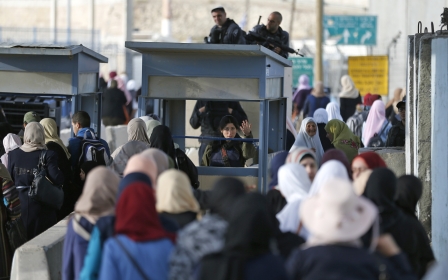US House passes resolution backing two-state solution

The US House of Representatives passed a symbolic resolution backing a two-state solution to the Israeli-Palestinian conflict in an implicit rebuke of the Trump administration's declaration that Israeli settlements in the occupied West Bank are not necessarily illegal.
In a 226 to 188 vote, largely along partisan lines, the Democrat-controlled House on Friday approved Resolution 326, which also opposes Israeli plans to annex parts of the West Bank and calls for resuming US aid to Palestinians.
Congresswoman Rashida Tlaib was one of four Democrats who opposed the resolution, noting that the bill fails to mention the word "occupation".
"I rise today as the granddaughter of a strong, loving Palestinian woman - my sity [grandmother]," Tlaib said on the House floor before the vote. "And for me to stand up for her human dignity, I must oppose House Resolution 326. This resolution not only endorses an unrealistic, unattainable solution - one that Israel has made impossible - but it also legitimises inequality, ethnic discrimination and inhumane conditions."
New MEE newsletter: Jerusalem Dispatch
Sign up to get the latest insights and analysis on Israel-Palestine, alongside Turkey Unpacked and other MEE newsletters
Draped in a Palestinian keffiyeh, Tlaib said Israel's nation-state law, which was passed in July 2018, relegates non-Jewish citizens to second-class status in the country.
"Separate but equal didn't work in our country," the congresswoman said, referring to the racial segregation system in southern US states that discriminated against African Americans.
"And I can't see it possible in other countries. Given our nation's history of segregation, we should recognise when such injustices are occurring. We cannot be honest brokers for peace if we refuse to use the words 'illegal occupation by Israel'."
After the vote, Congresswoman Ilhan Omar said she also was unable to support the bill, despite initially co-sponsoring it.
Omar said removing references to "occupation" from the original draft and adding an amendment "committing to 'ironclad' support for $38 billion in military aid to Israel with no conditions" gutted the resolution.
"When it comes to this issue, you are either for peace or you are for occupation. But you can't be for both," she wrote on Twitter. "For this reason, I voted no."
'Special relationship'
But support for the two-state solution remains a stalwart of American policy, and top Democrats continue to be some of the staunchest defenders of Israel in Washington.
Friday's resolution stressed the "special relationship between the United States and Israel" and reaffirmed America's commitment to allocating and delivering aid to Israel.
'This resolution not only endorses an unrealistic, unattainable solution - one that Israel has made impossible - but it also legitimises inequality, ethnic discrimination and inhumane conditions'
- Congresswoman Rashida Tlaib
Still, most Democrats voted in favour of the motion, while most Republicans voted against it.
House Majority Leader Steny Hoyer, a staunch supporter of Israel, said the resolution is merely a "restatement of America's policy" in support of a two-state solution.
Congressman Andy Levin, a Democrat from Michigan, said if the possibility of a two-state solution becomes impossible, Israel's security would be endangered.
"Make no mistake, without a two-state solution, Israel's future as a secure Democratic homeland for the Jewish people will be in jeopardy," Levin said.
The vote comes only weeks after US Secretary of State Mike Pompeo announced that the Trump administration considers Israeli settlements to be "not per se inconsistent with international law".
The Fourth Geneva Convention prohibits an occupying power - in this case, Israel - from moving its civilian population into territory it occupies, and settlements have been widely denounced as a violation of international law.
Congresswoman Barbara Lee, a California Democrat, accused the Trump administration of "actively working against a two-state solution" by reversing US policy against "illegal settlement expansion".
Republicans slam resolution
While support for Israel remains strong in Washington, members of Donald Trump's Republican Party painted the two-state resolution as a political ploy by Democrats to rebuke the US president.
North Carolina Republican Virginia Foxx slammed the motion, accusing its backers of advancing attempts by "radical leftists [to score] goals against the Trump administration".
She added that the vote would undermine the prospects of a negotiated two-state solution and blamed Palestinians for the failure of the peace process.
"I oppose this partisan resolution that politicises and therefore jeopardises the sacred issue of Congress's support for Israel," Foxx said on the House floor on Friday.
This week, after a meeting with Pompeo in Portugal, Israeli Prime Minister Benjamin Netanyahu said Israel has the "full right" to annex parts of the West Bank.
The congressional resolution explicitly warns against annexation.
"A United States proposal to achieve a just, stable, and lasting solution to the Israeli-Palestinian conflict should... discourage steps by either side that would put a peaceful end to the conflict further out of reach, including unilateral annexation of territory or efforts to achieve Palestinian statehood status outside the framework of negotiations with Israel," it reads.
Middle East Eye delivers independent and unrivalled coverage and analysis of the Middle East, North Africa and beyond. To learn more about republishing this content and the associated fees, please fill out this form. More about MEE can be found here.





